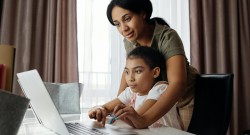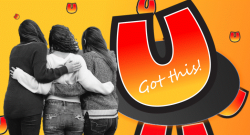Author: Tija UPOPOLIS
Youth Takeover! “The Social Model, Oversimplified” by Caelin
The way both disabled, and non-disabled people view disability can vary greatly. Different people with different mindsets, upbringings, lived or learned experiences & confidence levels; these things all shape how a person views disability. Generally, people’s views of disability fall into one of two categories: the medical model, and the social model.
In brief, in the medical model of disability, the person is disabled by their impairment, and emphasis is placed on a ‘cure’ or ‘almost cure.’ The person should adapt to their world. The medical model can create a mindset completely focused on cure and may cause people to feel broken or less-able.
In the social model, ‘disabled’ and ‘impairment’ are not the same. This model says that the person is not disabled by their impairment, but rather, their environment or society that is not accessible to them. It means disabled people are seen as equals and looked at for their abilities and meaningful achievements.
For example, under the social model, if I’m in a restaurant that has an electronic menu, I am not disabled in that situation; if they didn’t have an accessible menu, I am disabled in that situation, because the environment isn’t accessible to me, not because of my visual impairment. If I’m in class, and I’m not provided with digital materials, I am disabled because they’re not accessible.
I subscribe to the social model. It’s very freeing and solidifies that I am not the problem or in need of a cure, but society should be made accessible to me. Not only that, but able-bodied have a genuine, selfish interest in universal design as well, known as the ‘curb cut phenomenon;’ curb cuts help people in wheelchairs, but also cyclists, skateboarders, and parents pushing baby strollers. We all benefit when everyone is given equitable access.
Caelin is a Upopolis user. He has oculocutaneous albinism, which causes his eyes to have light sensitivity, poor visual acuity and no depth perception. Caelin has been teaching us about visual impairment since he joined Upopolis, and has also kept us laughing with his jokes and humour!
5 interventions to get the youth in your life TALKING!
Sometimes, as an adult, it may be challenging to connect with youth. As youth grow older, they’re finding their independence. It’s natural for them to begin to explore relationships with friends and themselves. They’re interested in things we have trouble relating to and sometimes it’s as though they can’t even be bothered talking to us!
However, research show youth who share their emotions have better mental health. They’re more likely to talk openly about any problems they might be facing in their life, which gives us the opportunity to help them with cope with these challenges.
On Episode 10 of the Upopolis Podcast, our host Krista Naugler offers 5 therapeutic interventions for youth. With over 24 years of experience working with youth in many settings, Krista is able to identify her tools of the trade for helping youth connect with themselves, with others, and with you!
Whether you’re a child life specialist, parent, teacher, or service provider in the community, you’ll find these interventions helpful for your practice. Read on to learn the top 5 that Krista suggests using when working with youth:
1900’s texting – who are the people that make up this youth’s support system?
We know youth are into their devices, so meet them where they’re at. For this intervention, you can either use a real device or use old school pen and paper.
Have the youth write down something that they would like to say to someone who has been there for them, sort of like a note of thanks or acknowledgement. Then have them read the note to that person or send them the actual text. This gives them an opportunity to reflect on the supports they have available and to practice sharing with those people their feelings and gratitude. Bonus, they’ll see how touched everyone is to receive a note of thanks!
Fingerprint stories – helping our youth share a story, thought or feeling
This intervention requires an ink pad and a photo copier. Make an ink print of the youth’s finger or thumb print, then photocopy and enlarge it until it fills the better part of an 8×10”
paper. Place a blank white piece of paper over top of the enlarged photocopy and place on a window or lightboard (you may need tape). Give the youth a theme and have them write a story following the lines of their fingerprint. They can write about their experiences, feelings, dreams, an adventure, or a theme related to a goal you have for them. Once they have filled the fingerprint lines with their story, remove it from the light source and decorate it!
Learning from our youth – connect with them by having them teach you something
Ask the youth to teach you something new, like a favourite game they have! This helps them be the expert in something and gives them back a sense of control. An alternative is learning something new together, like coding. This provides them with something to learn and focus on, which is especially helpful if you need to encourage them to focus their time and energy into something positive.
Graphic design – youth can express themselves or educate others
There are TONS of apps and web-based programs for creating graphics; PicCollage, Canva and Smilebox to name a few. Helping youth design things like t-shirt logos, recipe cards and journal pages gives them an expressive outlet. It’s also another way to help youth feel like the experts if they plan to create something to help educate family or people in their class. You will be so surprised with what youth come up with!
Upopolis – connecting youth online with peers
Upopolis is a way to connect youth with others who are experiencing similar or the same journeys in life. We have spaces for youth with a chronic or critical illness/disability, a space for their siblings, and a space for youth who are grieving the death of a loved one.
A bonus of Upopolis is that youth get to help create content for the website and social media, they can access vetted medical content, and they can gain amazing experiences like volunteering, guest starring on our podcasts, and cowriting a blog.
If you have any questions about anything on this list, find us on social media @upopolis or send us an e-mail at support@upopolis.com. Happy creating!
Halloween Happenings: How to explain (and celebrate) this year’s new traditions!
We know, Halloween 2020 is going to be very different this year. We could not have imagined back in March that we would still be faced with a pandemic almost 8 months later! But here we are, trying to flatten the COVID-19 curve while also trying to normalize the world for our children. It’s been a long year, but you’ve come this far! Congratulate yourself.
We don’t know how long this new normal will last, but we do know how important it is to continue to celebrate holidays and family traditions even if it means doing things different than last year. Always remember, children are resilient. You can, however, help them cope better by giving them simple and honest information about why things will be different this year.
You can help your children cope with changes associated with Halloween by following a few easy suggestions:
- Explain, in simple terms, why normal Halloween activities are unsafe right now. If you haven’t done so already, you may have to start with an explanation of COVID-19. Click this link for more information on how to do this: https://www.mayoclinic.org/diseases-conditions/coronavirus/in-depth/kids-covid-19/art-20482508
- Validate their feelings about cancelled/changed activities. It is normal for your children to be disappointed/frustrated/sad about not being able to trick-or-treat, go to costume parties, or celebrate with friends.
- Offer new suggestions for possible activities, and involve them in choosing how they will celebrate. This allows them to feel a sense of control over something that they don’t have much control over.
So, how do you celebrate Halloween if you can’t do traditional trick-or-treating (or whatever your Halloween heart may desire)? The Centers for Disease Control and Prevention (CDC) released guidelines around Halloween activities as many traditional Halloween activities can be high-risk for spreading viruses. With the help of the CDC, input from child life specialists, and youth users on Upopolis, we have compiled a list of alternative Halloween activities so you can continue to make family memories!
Lower risk activities:
- Carving or decorating pumpkins with members of your household
- Carving or decorating pumpkins outside, at a safe distance, with friends or neighbours
- Decorating your house, apartment or living space
- Doing a Halloween scavenger hunt either inside, or outside at a safe distance from others’ homes
- Having a Halloween movie night with treats
- Having a “Candy Hunt”, around your house, living space or yard; hide the treats and have your children search for them!
- Having a virtual Halloween contest with friends and family
- Baking then decorating Halloween themed cookies
Moderate risk activities:
- Visiting pumpkin patches or orchards where people use hand sanitizer before touching pumpkins or picking apples, wearing masks is encouraged or enforced, and people are able to maintain social distancing
- Participating in one-way trick-or-treating where individually wrapped goodie bags are lined up for families to grab and go while continuing to social distance
- Meeting with friends or neighbours, outside, to show off each other’s costumes at a safe distance, while wearing cloth or medical grade masks
How will you be celebrating Halloween this year? Your answer may be different than last year, but if spending time with loved ones is already part of the plan, you’re ahead of the game.
Happy Halloween!
4 Tips for Coping with the Potential Return of COVID-19 Restrictions
The third episode of our podcast, Upopolis: The Podcast, welcomed three child life specialists who also happen to be parents. Their experiences during the COVID-19 pandemic were all different, but they all parented with a unique lens: that of a child life specialist, whose role it is to help children cope with stressful life events.
In this latest episode, host and certified child life specialist, Krista Naugler, brought up the perhaps expected future of our community: the return of COVID-19 restrictions. As case numbers increase around the world, the possibility of returning to the “quarantine” life we dealt with in the Spring may be inevitable.
These working professionals shared the trials and tribulations of parenting during a world pandemic and how their behaviours and mindset were affected. Check out their takeaway tips from what they learned from the first time around so you can be prepared for the potential return of restrictions:
Tip #1: Vet your resources
Your children may be hearing so much information from different sources – their teachers, friends, family, or the news. Make sure you know where their information is coming from and if it’s factual. An explanation of a swab to test for COVID-19 may be explained very inaccurately by someone online than it would be from a hospital resource. “Check and vet” to keep your children in the know.
Tip #2: Be your child’s go-to for tough topics
Our children know more than they lead on. Although they may not always be open to talking about it, let them know that it’s OK to have tough conversations and that you are always here to support them and answer questions. If they ask questions, be honest with your explanations while continuing to reassure them that they are safe.
Tip #3: Practice gratitude
Some days will be really tough, and that’s OK. Take time at the end of each day to talk with your children about three really great things that happened. Emphasize their strengths, and pick out the small positives.
Tip #4: Always remember, you know your child best
Parenting is hard, especially during a world pandemic. This time has encouraged us to reexamine our expectations as a parent. Remember, you are doing what is best for your child. You know them best. Just because you might feel like you’re failing, doesn’t mean you’re not doing an awesome job. We’re all going to feel guilty, but every day is a new day and you are doing the best you can.
Check out Upopolis: The Podcast on Apple Podcasts or Spotify Podcasts, or by clicking this link: https://island.upopolis.com/en/resources/#podcasten
Supporting Your Child as They Return to School Post COVID-19 Lockdown
Can you believe its been almost 6 months since your children stepped foot inside a classroom? Us either. What a half year it has been!
For some of us it was a time to relax and embrace the little joys in life. The COVID-19 pandemic, and subsequent lock down, forced us to slow down. It reminded us what is so valued – family and relationships.
For others, it was a challenge to simply get through the day. Many of us continued to go into work, putting ourselves and our loved ones at risk. Relationships were strained as partners worked overtime to meet their employer’s new demand, and on the other end of the spectrum, so many people lost jobs and endured intense financial stress. All the while, our children were at home from school; learning to learn online and requiring either 24/7 supervision or constant parenting in order to make the most of their time off school.
Congratulations for making it through, no matter what your situation brought to you.
And now it is almost September. The start of a new school year, fresh beginnings, and a jump into new routines. This time, with the stress of a world pandemic still on our shoulders. It’s only normal for you, and your child, to be worried about returning to school.
Here are some tips from our child life specialists on how to support your child during their return to school after a lockdown.
- Talk to your child about how they are feeling about going back to school. This can be an open-ended question as simple as, “School will be different this year. How are you feeling about going back?” It is normal for your child to be excited, scared, worried or happy at different times throughout their return, or all at once. It’s important to validate what they are feeling (“I totally understand why you’re feeling that way”) and normalize it (“other kids/teens are probably feeling the same” or “I am feeling a worried about the new school year, too!”). Offer your support for when they feel like talking and continue to have discussions about their feelings throughout the transition.
- Talk to your child about what their new routine and school day may look like so they have as much information as possible. The more children know, the less they imagine, which helps with decreasing any stress or anxiety about situations. Talk to your child about what the timing of their day may look like and any changes in their classroom (ie. the layout, class sizes, playing with friends, recess). If you don’t know these answers, try to get in touch with your school or child’s teacher to ask questions.
- Reassure them about safety. For months we have been told to stay at home, wash our hands, and to not come into close contact with anyone. Now, children and youth are being told to go back to school in classrooms with dozens of other people. This can be confusing for them. Continue to reassure them that the precautions schools have put in place are safe. Provide them with tips on how they can be safe themselves, such as washing hands and wearing masks.
- Help to prepare them for masking. In many cities, children and youth will be required to wear masks all day while at school. Help to get them ready for this by: allowing them to decide what colours/styles of mask they wear, “practicing” wearing the mask during the day, teaching them how to properly put it on and take it off, as well as good hand hygiene. Don’t’ forget, masking all day isn’t normal for them so continue to validate how they may be feeling about it.
- Be patient with your child and yourself. Your child hasn’t had a set routine for many months now. They’ve likely been going to bed and waking up later, having meals at all hours of the day, and enjoying more freedom. Although this is totally normal, they may have a difficult time starting a new routine. Be patient with them and understand they may experience mixed emotions, as will you. It is normal to feel overwhelmed, frustrated, or annoyed. Your children will need some time to settle into a normal routine, so don’t put pressure on yourself to have things perfect right from the start.
- Seek support when you need it. You are not alone in this new transition. Reach out to friends and other parents to help validate what you are feeling. If your child is having trouble returning to school, reach out to their school to work with your child’s teachers on how to best support them.
Remember, our lives were turned upside down over the past 6 months. We couldn’t prepare ourselves for a world pandemic, but you are doing the best you can and you are not alone. We are all humans and will continue to adjust to new situations and experiences over the next many months with many emotions. Be patient with yourself and your family. You’ve got this!
If you’d like to gain more support on helping your child to return to school, e-mail a child life specialist at support@upopolis.com.
UGotThis! A COVID-19 Workshop for Teens
Wow, what a whirlwind couple of months it’s been for everyone! COVID-19 has brought us a lot of change. Our routines are different, we haven’t seen close family members for almost two months, some of us are working from home, our favourite stores and restaurants are closed, going to the grocery store is a planned adventure… the list goes on!
For kids and teens, a change in routine is especially hard.
During challenging experiences, children and youth need is a listening ear, the acknowledgment that what they’re feeling is normal, and some strategies to help them cope with change. We are here to help!
Upopolis is hosting UGotThis! A five-day workshop for youth aged 10 – 18 years old, in response to COVID-19 and self-isolation. The workshop offers youth exercises to explore their thoughts and feelings surrounding the pandemic and isolation, tips to help plan their days, support in developing positive coping strategies, encouragement on setting personal goals, and live support chats to connect with child life specialists and other youth participants. The skills youth learn during the workshop can be transferred to the remainder of this pandemic, and can be used to help them cope with any potentially challenging events they are faced with in their future lives.
Your child does not have to be part of our Upopolis community to join, the workshop is FREE, and it is facilitated entirely by certified child life specialists who are trained to support children and youth through life’s challenging events. In order for children and youth to come out of this experience positively, they need to be given the tools to be resilient.
Check out a sample of one of our lessons from Krista, a Upopolis child life specialist, at this link:
Do you want to sign up your child or know a youth who needs some support during the pandemic? E-mail support@upopolis.com to get them started!
Meeting the Needs of Siblings
A brother or sister’s illness or hospitalization can have quite the impact on siblings. This medical situation is entirely new to them and the family as a whole. The sibling may hear and see things they don’t fully understand, their routines may be shaken up, and they may be separated from their family during hospital visits, admission or appointments. These siblings often find their brother or sister is receiving special attention and they themselves tend to feel left behind.
This is all normal.
The family may start to feel challenges affecting their dynamics and relationships, and the siblings can often start to feel lonely, isolated, confused, guilty, angry or worried. Parents may start to find the siblings of these children with illness or hospitalization are expressing their feelings through new behavioural issues, such as a difference in eating and sleeping habits, aggression, becoming withdrawn, difficulties in school, regressing to skills of an earlier age (such as wetting the bed), and clinging to parents.
This is all normal, too!
So how can we support these siblings?
Being aware of these changes and talking openly with your child is the first step in supporting them during this stressful time.
Tips for Supporting Siblings
- Talk openly and honestly with your child about the events or situation affecting the family using information and language they understand. It is important to do this throughout your journey.
- Continue daily routines and schedules as much as you can. Keep up their expectations (they still need to do their homework!) and engage in regular family traditions (do you have pizza night every Friday? Bring it into the hospital with them!) This gives your child a sense of security and stability.
- Talk with your child about how they are feeling about their brother or sister’s illness or hospital admission; ask them if they have any questions or concerns.
- Acknowledge these feelings and thank them for telling you! It’s normal to be feeling the way they are and your child needs to hear this.
- Keep all your children connected with one another. This can be done through phone calls, texts, video chats, sharing drawings or photos, and making gifts like cards for one another.
- Try to maintain alone time with the sibling. Would you have normally gone to their soccer game? Arrange for someone to stay with your other child so you can make these special moments.
- Continue to reassure siblings that they did not cause this, they most likely will not get sick themselves, and that they are valued and loved.
Who else can help you?
It really does take a village to raise a child! Don’t be afraid to ask for help if you need it.
- Let your child’s school know about this situation so they have someone available there, like a teacher or counselor, to support them.
- If you are not able to be with your child, make arrangements with an adult who your child is familiar with to spend time with them.
- Look into support groups for siblings. Siblings will have the chance to meet and interact with others who are sharing the same feelings and experiences as themselves. This helps relieve feelings of loneliness and isolation.
Do you know a youth who is a sibling and is in need of more support? Upopolis can help! With a doctor’s referral, your sibling can join our new Sibling Pop-Up, a safe, online space where siblings can meet and connect with one another. Visit upopolis.com – Healthcare Professionals to have your child referred to our online platform, or e-mail support@upopolis.com for more assistance.
The takeaway? It is important for siblings to know that everything they are feeling is normal, and that they are a valued member of the family. Expressing their feelings, whether that’s with you or another support person or group, is key to helping them cope during these stressful situations. You may find that with some love and attention to detail, this stressful time turns into a positive experience for siblings and can help them develop into understanding and resilient adults.






